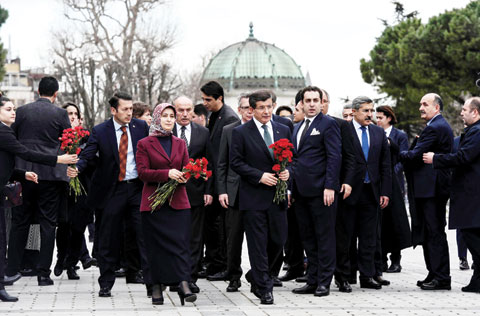 ISTANBUL: Turkish Prime Minister Ahmet Davutoglu (right) and his wife Sare Davutoglu arrive to place flowers in tribute to the victims at the site of yesterday’s attack in the city’s tourist hub of Sultanahmet. — AFP
ISTANBUL: Turkish Prime Minister Ahmet Davutoglu (right) and his wife Sare Davutoglu arrive to place flowers in tribute to the victims at the site of yesterday’s attack in the city’s tourist hub of Sultanahmet. — AFP
ISTANBUL: Turkey said yesterday it had arrested one person in connection with a deadly suicide bombing that ripped through the historic heart of Istanbul, killing 10 tourists, most of them Germans. Ankara has said that Tuesday's attack was carried out by a 28-year-old Syrian who belonged to the Islamic State (IS) group and had recently entered Turkey from Syria.
One person was arrested on Tuesday evening in connection with the bloodshed, Interior Minister Efkan Ala said on Wednesday, without explaining the suspect's role in the strike. In the wake of the attack, Turkish security forces rounded up 68 suspected IS members across the country, state media said, but it was not clear if any of them were directly connected to the Istanbul bombing.
"The investigation is continuing in a very intensive way," Ala told a news conference in Istanbul alongside German Interior Minister Thomas de Maiziere. De Maiziere said there was "no indication" the attack specifically targeted Germans, saying there was no need to cancel travel plans. "It was an attack against humanity," he said. "I see no reason to refrain from trips to Turkey." But the German foreign ministry has advised its nationals to keep away from large groups in public places and tourist attractions in Istanbul. German tourism giant TUI said customers who had booked trips to Istanbul can switch destination without paying a penalty.
Posing as a refugee?
Turkey has been hit by a string of deadly attacks blamed on jihadists over the last year, including a double suicide bombing in October in Ankara that killed more than 100 people. But Tuesday's bombing was the first time in recent memory tourists had been targeted in the heart of Istanbul.
The bomber, identified as Nabil Fadli, detonated his charge on Sultanahmet Square which is home to Turkey's most visited historic sites including the Ottoman-era Blue Mosque and Hagia Sophia church. The explosion went off by the Obelisk of Theodosius, a monument from ancient Egypt that was re-erected by the Roman Emperor Theodosius and is one of the city's most iconic landmarks.
The Sabah daily said the bomber had entered Turkey as a refugee from Syria on January 5. He was then fingerprinted by the Turkish migration service, explaining why the authorities were able to identify the bomber so rapidly after the attack. The Hurriyet daily said Turkey's spy agency had twice issued warnings over the risk of a suicide attack in Istanbul.
'Pray for the victims'
Police yesterday removed a cordon preventing access to the area of the attack, which was quickly thronged by media and some tourists, an AFP correspondent said. Some placed red roses by the obelisk, which appeared to have sustained no damage in the bombing.
Almost all of the victims were German, with Ankara giving the figure of nine while Berlin put the number at eight. Peru also said one of its nationals had died in the attack. Another 15 people were wounded, most of them Germans but also Norwegians, Peruvians and at least one Turk. Two Germans were in serious condition.
The tourists were part of a group of 33 who had been staying at a boutique hotel in the upmarket Galata district and had been bussed to Sultanahmet that morning, media reports said. "I saw the young man pull the pin and I shouted 'run!' in German. Then we started to run away, and the bomb instantly exploded," the group's tour guide Sibel Satiroglu told investigators, the Hurriyet newspaper said.
In impromptu remarks at his weekly audience, Pope Francis called on all believers to pray for the victims. "May the Lord, the merciful, bring eternal piece to the departed, comfort to their families, the solidarity of all society and may he convert the hearts of violent men," he said.
A belated crackdown
Long accused of failing to crack down on IS, Turkey has in recent months moved against jihadist cells operating on its territory. Among those arrested in the wake of Tuesday's bloodshed were 16 people suspected of planning a major attack in Ankara, Anatolia news agency said.
Yesterday, three more suspected IS members were detained in the southern resort city of Antalya. All three are Russian citizens, it added. And a week before the attack, 220 people "identified" as IS members were detained in Turkey, the interior minister said on Wednesday. Despite criticism from Western allies that it was not doing enough in the fight against IS, Turkey is now hosting aircraft from the US-led coalition engaged in deadly attacks on the jihadist group strongholds. - AFP




